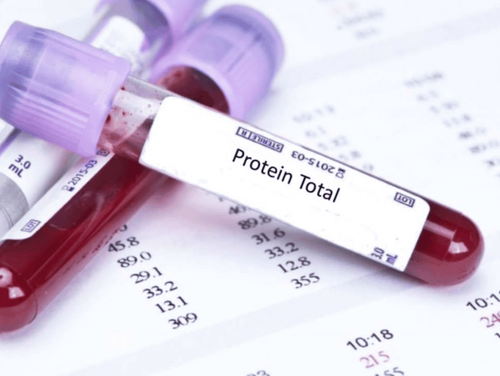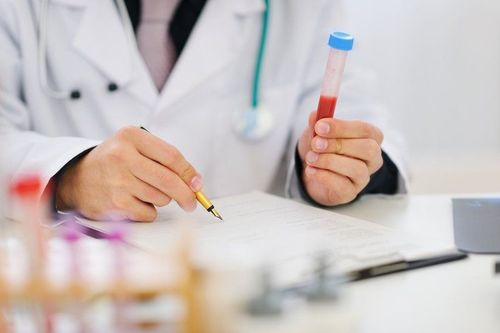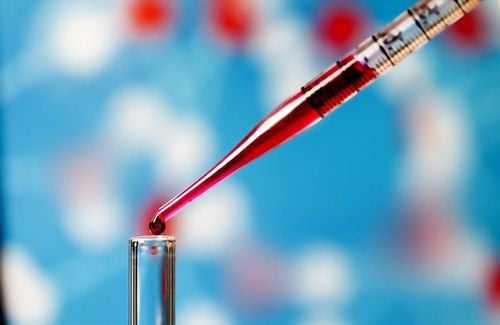This is an automatically translated article.
Posted by Master, Doctor Tran Quynh Trang - Laboratory Department - Vinmec Times City International Hospital
Protein is made up of 20 types of amino acids necessary for the body in building cells and tissues, for the growth, development and protection of health. Protein is also a structural component of most parts of the body, making enzymes and hormones.
1. Significance of a blood test to assess the amount of protein
Protein blood tests help measure the total amount of proteins in your blood. There are two main types of proteins: Albumin and Globulin.
Albumin is an important serum protein, it makes up about 60 - 80% of the total protein in the body. Albumin is produced by the liver, in a quantity of about 10.5g per day. The liver is the only organ that synthesizes albumin, so when albumin decreases, it is often due to decreased liver function, especially when cirrhosis. In healthy people, albumin is produced and maintained at a stable concentration in the blood to perform many important functions such as:
Maintaining the oncotic pressure of the blood, preventing water from penetrating the vessel wall into the intercellular space. . Involved in peripheral protein synthesis by providing amino acids. Participating in the transport of small-molecule substances in the body such as: Thyroid hormones, fatty acids, bilirubin, steroid hormones, drugs and many other products produced in the metabolism.
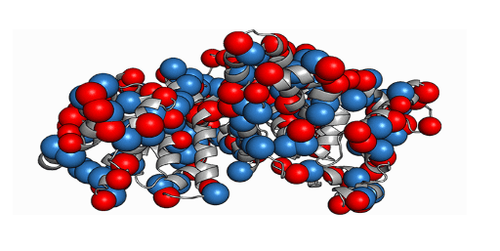
Cấu trúc phân tử Albumin
When there is a change in the level of albumin in the blood, the body shows signs of damage or dysfunction. Albumin in the blood increases when the body is dehydrated. In contrast, blood albumin decreases when the liver's function to produce albumin is inhibited, because albumin is extensively broken down or excreted in the urine. All cases of blood albumin testing with abnormal results need attention and prompt treatment.
Thus, the blood albumin test is a method to help determine the albumin content in the blood to aid in the diagnosis of diseases of the body or to monitor and evaluate the patient's condition during treatment. Blood albumin test is also an important tool to help assess liver and kidney function.
Blood albumin tests are done when your doctor wants to check your liver, kidney and other body functions. This test is usually indicated for people with symptoms such as:
Body fatigue, loss of appetite, undigested food Loss of weight fast and a lot Jaundice, yellow eyes Swollen hands, feet, eyes, abdomen. Globulin makes up 40% of the remaining protein in the blood. Globulins are a group of different proteins, some produced by the liver and some by the immune system. Protein globulins vary in size, weight, and function. These are grouped according to how they move on electrophoresis including transport proteins, enzymes, complements and immunoglobulins (IgA, IgD, IgE, IgG and IgM.). The globulin ensures the following vital functions of the body such as:
Participate in maintaining acid-base balance; Involved in the body's inflammatory response; Plays a key role in the immune defense mechanism and the production of antibodies; Involved in the regulation of blood clotting and fibrinolysis.
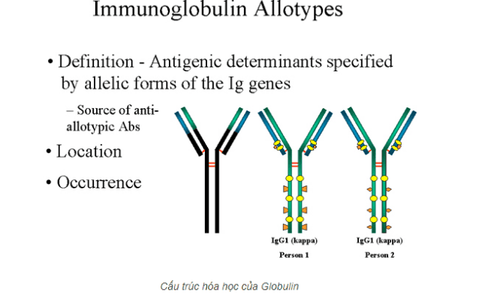
Cấu trúc hóa học của Globulin
The A/G ratio is the Albumin/Globulin ratio calculated from the values obtained by direct measurement of total protein and Albumin. This ratio represents the relative amounts of albumin and globulin in the blood of the test person.
2. When to test for total protein?
Serum total protein can be tested during routine physical examination. Your doctor may also use this test to help diagnose a variety of diseases that affect protein levels.
People with conditions affecting the gastrointestinal tract, liver or kidneys may need to have total protein tests done at follow-up visits to monitor recovery during treatment.
The patient may be ordered to have a total protein test if any of the following are present:
Uncontrolled weight loss Loss of appetite Fatigue Fatigue or swelling due to excess tissue fluid. Difficulty urinating Nausea or vomiting Symptoms of malnutrition Serum protein quantification is an important indicator to help doctors accurately diagnose the disease of each patient. Therefore, in case there are symptoms of liver, kidney or organ damage, patients should go to reputable medical centers to perform a quantitative protein test.
Vinmec International General Hospital with a system of modern facilities, medical equipment and a team of experts and doctors with many years of experience in neurological examination and treatment, patients can completely peace of mind for examination and treatment at the Hospital.
To register for examination and treatment at Vinmec International General Hospital, you can contact Vinmec Health System nationwide, or register online HERE.





